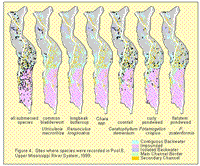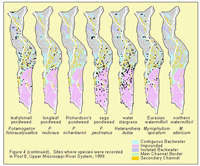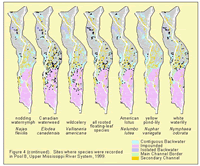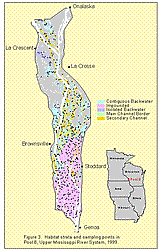1999 Results in Pool 8 of the Upper Mississippi River
Sampling Efforts
Sampling began on June 21 and ended on July 26, 1999 in Pool 8, Upper Mississippi River System.� Of the 600 sites targeted for sampling at the beginning of the season, 595 were actually sampled (Figure 3).� Five sites could not be accessed because dense emergent vegetation and low water inhibited access.�
Submersed Aquatic Vegetation
The status of submersed aquatic vegetation (SAV) in Pool 8 varied among the strata sampled.� Isolated and contiguous backwaters had the highest abundance of SAV (Table 3; Figure 4).� Impounded areas, secondary channels, and main channel border followed in decreasing order.� Sizable beds were found throughout most of the shallow water areas, except in the main channel border areas and the lower terminate of the pool where sizable beds were generally absent.� The SAV covered about 58.1% of the shallow water areas poolwide.
Except the main channel border areas, each of the other four strata sampled harbored a rich assemblage of submersed plant species (10 or more species).� A total of 16 species were recorded in the entire pool.� Coontail and Canadian waterweed were the two most abundant species in the contiguous backwaters while coontail was most abundant in isolated backwaters.� Water stargrass was most abundant in the impounded areas of Pool 8 and sago pondweed and wildcelery in main channel border areas.� No species was more abundant in secondary channels.
Rooted Floating-Leaf Vegetation
White waterlily, American lotus, and yellow pond-lily were the three rooted floating-leaf species recorded. The percent cover of rooted floating-leaf species was the highest in the isolated backwaters.�White waterlily was scattered in much of the isolated and contiguous backwaters, while American lotus and yellow pond-lily had a much more limited distribution in contiguous backwaters. The three species together covered about 7.1% of the shallow water areas.
Comparison of 1998 and 1999 Results
Overall, submersed vegetation increased in frequency and abundance index from 1998 to 1999, while species composition remained about the same.� Most of the increase occurred in contiguous backwaters and main channel border strata.� The only species to change in frequency by more than 10% was an increase in water stargrass.� Rooted floating-leaf species composition, frequency, and cover remained the same from 1998 to 1999.
Table 3.� Percent frequency, abundance index (AI), cover, and standard errors of submersed and rooted floating-leaf vegetation in Pool 8, Upper Mississippi River System, 1999.| Common name (Scientific name) |
Contiguous backwater n = 172 |
Isolated backwater n = 28 |
Impounded n = 225 |
|||
| Freq | AI | Freq | AI | Freq | AI | |
| bladderwort, common (Utricularia macrorhiza) |
4.7 � 1.6
|
0.5 � 0.2
|
39.3 � 9.4
|
4.3 � 1.2
|
-
|
-
|
| buttercup, longbeak (Ranunculus longirostris) |
1.7 � 1.0
|
0.1 � 0.1
|
-
|
-
|
-
|
-
|
| chara (Chara spp.) |
2.9 � 1.3
|
0.4 � 0.2
|
21.4 � 7.9
|
2.7 � 1.0
|
-
|
-
|
| coontail (Ceratophyllum demersum) |
72.7 � 3.4
|
12.8 � 0.9
|
89.3 � 6.0
|
16.2 � 1.8
|
4.4 � 1.4
|
0.4 � 0.1
|
| pondweed, curly (Potamogeton crispus) |
28.5 � 3.5
|
3.3 � 0.5
|
17.9 � 7.4
|
1.7 � 0.8
|
6.7 � 1.7
|
0.7 � 0.2
|
| pondweed, flatstem (P. zosteriformis) |
25.6 � 3.3
|
3.5 � 0.5
|
17.9 � 7.4
|
2.0 � 0.9
|
1.3 � 0.8
|
0.1 � 0.1
|
| pondweed, leafy/small (P. foliosus/pusillus) |
42.4 � 3.8
|
5.8 � 0.6
|
46.4 � 9.6
|
6.0 � 1.4
|
2.2 � 1.0
|
0.2 � 0.1
|
| pondweed, longleaf (P. nodosus) |
7.6 � 2.0
|
0.9 � 0.3
|
-
|
-
|
0.4 � 0.4
|
0.1 � 0.1
|
| pondweed, Richardson's (P. richardsonii) |
-
|
-
|
-
|
-
|
-
|
-
|
| pondweed, sago (P. pectinatus) |
30.2 � 3.5
|
3.8 � 0.5
|
10.7 � 6.0
|
1.1 � 0.6
|
17.8 � 2.6
|
2.2 � 0.4
|
| stargrass, water (Heteranthera dubia) |
38.4 � 3.7
|
4.6 � 0.5
|
3.6 � 3.6
|
0.2 � 0.2
|
27.6 � 3.0
|
3.7 � 0.5
|
| watermilfoil, Eurasian (Myriophyllum spicatum) |
27.9 � 3.4
|
3.6 � 0.5
|
3.6 � 3.6
|
0.2 � 0.2
|
6.7 � 1.7
|
0.5 � 0.1
|
| watermilfoil, northern (M. sibiricum) |
-
|
-
|
*
|
*
|
-
|
-
|
| waternymph, nodding (Najas flexilis) |
8.1 � 2.1
|
1.3 � 0.4
|
39.3 � 9.4
|
5.2 � 1.4
|
-
|
-
|
| waterweed, Canadian (Elodea canadensis) |
65.1 � 3.6
|
11.1 � 0.9
|
57.1 � 9.5
|
9.9 � 2.3
|
12.9 � 2.2
|
1.5 � 0.3
|
| wildcelery (Vallisneria americana) |
5.8 � 1.8
|
0.8 � 0.3
|
-
|
-
|
12.4 � 2.2
|
1.7 � 0.3
|
| all submersed species |
92.4 � 2.0
|
22.5 � 1.3
|
92.9 � 5.0
|
20.7 � 2.8
|
44.9 � 3.3
|
6.6 � 0.6
|
|
Freq
|
Cover
|
Freq
|
Cover
|
Freq
|
Cover
|
|
| lotus, American (Nelumbo lutea) |
19.2 � 3.0
|
7.2 � 1.5
|
-
|
-
|
1.3 � 0.8
|
1.2 � 0.7
|
| pond-lily, yellow (Nuphar variegata) |
2.9 � 1.3
|
0.4 � 0.2
|
-
|
-
|
-
|
-
|
| waterlily, white (Nymphaea odorata) |
30.2 � 3.5
|
10.1 � 1.7
|
71.4 � 8.7
|
48.6 � 7.5
|
0.4 � 0.4
|
<0.1� <0.1
|
| all rooted floating-leaf species |
43.0 � 3.8
|
15.8 � 2.0
|
71.4 � 8.7
|
48.6 � 7.5
|
1.8 � 0.9
|
1.2 � 0.7
|
*Because of inaccuracies in the strata map and geographical information system's receiver, the contiguous backwater site containing northern watermilfoil was actually located in an isolated backwater.
Table 3. Continued.
|
Common name
(Scientific name) |
Main channel
border n = 70 |
Secondary
channel n = 100 |
Pool 8
n = 595 |
|||
|
Freq
|
AI
|
Freq
|
AI
|
Freq
|
AI
|
|
| bladderwort, common (Utricularia macrorhiza) |
-
|
-
|
-
|
-
|
2.8 � 1.0
|
0.3 � 0.1
|
| buttercup, longbeak (Ranunculus longirostris) |
-
|
-
|
-
|
-
|
0.5 � 0.5
|
<0.1 � <0.1
|
| chara (Chara spp.) |
-
|
-
|
-
|
-
|
1.6 � 0.8
|
0.2 � 0.1
|
| coontail (Ceratophyllum demersum) |
4.3 � 2.4
|
0.3 � 0.2
|
18.0 � 3.9
|
1.8 � 0.4
|
28.8 � 2.2
|
4.7 � 0.5
|
| pondweed, curly (Potamogeton crispus) |
7.1 � 3.1
|
0.6 � 0.3
|
3.0 � 1.7
|
0.3 � 0.2
|
12.7 � 2.3
|
1.4 � 0.3
|
| pondweed, flatstem (P. zosteriformis) |
-
|
-
|
4.0 � 2.0
|
0.5 � 0.3
|
9.1 � 1.8
|
1.2 � 0.3
|
| pondweed, leafy/small (P. foliosus/pusillus) |
1.4 � 1.4
|
0.2 � 0.2
|
3.0 � 1.7
|
0.3 � 0.2
|
15.3 � 2.1
|
2.0 � 0.3
|
| pondweed, longleaf (P. nodosus) |
-
|
-
|
4.0 � 2.0
|
0.5 � 0.3
|
2.9 � 1.1
|
0.3 � 0.2
|
| pondweed, Richardson's (P. richardsonii) |
-
|
-
|
1.0 � 1.0
|
0.1 � 0.1
|
0.1 � 0.2
|
<0.1 � <0.1
|
| pondweed, sago (P. pectinatus) |
15.7 � 4.4
|
2.2 � 0.6
|
14.0 � 3.5
|
1.9 � 0.5
|
20.4 � 2.9
|
2.6 � 0.4
|
| stargrass, water (Heteranthera dubia) |
8.6 � 3.4
|
1.0 � 0.4
|
22.0 � 4.2
|
2.7 � 0.5
|
28.2 � 3.2
|
3.6 � 0.5
|
| watermilfoil, Eurasian (Myriophyllum spicatum) |
-
|
-
|
9.0 � 2.9
|
0.8 � 0.3
|
12.6 � 2.3
|
1.4 � 0.3
|
| watermilfoil, northern (M. sibiricum) |
-
|
-
|
-
|
-
|
0.2 � 0.3
|
<0.1 � <0.1
|
| waternymph, nodding (Najas flexilis) |
-
|
-
|
-
|
-
|
3.8 � 1.2
|
0.6 � 0.2
|
| waterweed, Canadian (Elodea canadensis) |
8.6 � 3.4
|
0.7 � 0.3
|
20.0 � 4.0
|
2.7 � 0.6
|
30.1 � 2.8
|
4.7 � 0.5
|
| wildcelery (Vallisneria americana) |
14.3 � 4.2
|
2.3 � 0.7
|
8.0 � 2.7
|
0.8 � 0.3
|
9.5 � 2.2
|
1.3 � 0.3
|
| all submersed species |
25.7 � 5.3
|
3.8 � 0.9
|
36.0 � 4.8
|
5.4 � 0.9
|
58.1 � 3.2
|
11.3 � 0.9
|
|
Freq
|
Cover
|
Freq
|
Cover
|
Freq
|
Cover
|
|
| lotus, American (Nelumbo lutea) |
-
|
-
|
4.0 � 2.0
|
1.4 � 0.9
|
6.6 � 1.6
|
2.8 � 0.9
|
| pond-lily, yellow (Nuphar variegata) |
-
|
-
|
-
|
-
|
0.8 � 0.6
|
0.1 � 0.1
|
| waterlily, white (Nymphaea odorata) |
-
|
-
|
4.0 � 2.0
|
0.6 � 0.3
|
12.0 � 1.9
|
4.8 � 0.9
|
| all rooted floating-leaf species |
-
|
-
|
6.0 � 2.4
|
1.2� � 0.6
|
16.6 � 2.1
|
7.1 � 1.2
|
|
Image Preview
|
Figure - Description
|
| Figure 3. Aquatic area strata and sampling points in Pool 8, Upper Mississippi River System, 1999. | |
 |
Figure 4. Sites where species were recorded in Pool 8, Upper Mississippi River System, 1999. Species: all submersed species, common bladderwort (Utricularia macrorhiza), longbeak buttercup (Ranunculus longirostris), Chara spp., coontail (Ceratophyllum demersum), curly pondweed (Potamogeton crispus), and flatstem pondweed (P. zosteriformis). |
 |
Figure 4. Continued. Species: leafy/small pondweed (P. foliosus/pusillus), longleaf pondweed (P. nodosus), Richardson's pondweed (P. richardsonii), sago pondweed (P. pectinatus), water stargrass (Heteranthera dubia), Eurasian watermilfoil (Myriophyllum spicatum), and northern watermilfoil (M. sibiricum). |
 |
Figure 4. Continued. Species: nodding waternymph (Najas flexilis), Canadian waterweed (Elodea canadensis), wildcelery (Vallisneria americana), all rooted floating–leaf species, American lotus (Nelumbo lutea), yellow pond-lily (Nuphar variegata), and white waterlily (Nymphaea odorata). |
Content manager: Danelle Larson
April 5, 2002Page Last Modified: April 17, 2018


